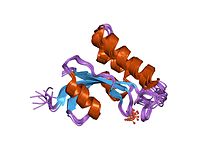Prolyl isomerase
Prolyl isomerase (also known as peptidylprolyl isomerase or PPIase) is an enzyme (EC 5.2.1.8) found in both prokaryotes and eukaryotes that interconverts the cis and trans isomers of peptide bonds with the amino acid proline. Proline has an unusually conformationally restrained peptide bond due to its cyclic structure with its side chain bonded to its secondary amine nitrogen. Most amino acids have a strong energetic preference for the trans peptide bond conformation due to steric hindrance, but proline's unusual structure stabilizes the cis form so that both isomers are populated under biologically relevant conditions. Proteins with prolyl isomerase activity include cyclophilin, FKBPs, and parvulin, although larger proteins can also contain prolyl isomerase domains.
Proline is unique among the natural amino acids in having a relatively small difference in free energy between the cis configuration of its peptide bond and the more common trans form. The activation energy required to catalyse the isomerisation between cis and trans is relatively high: ~20kcal/mol (c.f. ~0kcal/mol for regular peptide bonds). Unlike regular peptide bonds, the X-prolyl peptide bond will not adopt the intended conformation spontaneously, thus, the process of cis-trans isomerization can be the rate-limiting step in the process of protein folding. Prolyl isomerases therefore function as protein folding chaperones. Cis peptide bonds N-terminal to proline residues are often located at the first residue of certain types of tight turns in the protein backbone. Proteins that contain structural cis-prolines in the native state include ribonuclease A, ribonuclease T1, beta lactamase, cyclophilin, and some interleukins.
...
Wikipedia

